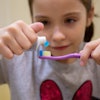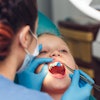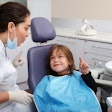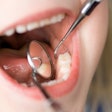Factors including sex, unhealthy lifestyles, and problematic internet use (PIU) may significantly increase the risk of caries in pediatric patients, according to research recently published in BMC Oral Health.
Furthermore, making small changes, including encouraging kids not to skip breakfast, having appropriate bedtimes, and reducing screen time, may help prevent cavities in children, the authors wrote.
"Being a girl, having an undesirable lifestyle, and PIU were significantly associated with multiple self-reported caries," wrote the authors, led by Masaaki Yamada of the University of Toyama in Japan (BMC Oral Health, January 23, 2025).
The study conducted a school-based questionnaire survey in Toyama Prefecture in Japan in 2018, which included 13,413 elementary school children. Children and parents completed a survey about lifestyle, basic characteristics, anthropometric data, and caries experience, they wrote.
Lifestyle factors included breakfast consumption, physical activity, sleep habits, and rules to restrict screen time. PIU was measured using the Japanese version of the Young Diagnostic Questionnaire (YDQ), with scores ranging from 0 to 8. Multiple caries were defined as having three or more caries.
Boys were more likely to skip breakfast, be physically active, be obese, have family screen time rules, and have higher PIU, while girls were more likely to be thin and brush their teeth more often. Nearly all girls (95.6%) brushed twice daily. Overall, 25.7% of children (24.4% of boys and 27% of girls) had multiple caries, they wrote.
In the fully adjusted analysis, significant risk factors for multiple caries included being a girl (adjusted prevalence ratio [aPR]: 1.13), higher grade level (5th grade: aPR 1.13; 6th grade: aPR 1.14), skipping breakfast (aPR: 1.11), late bedtime (10-11 p.m.: aPR 1.17; ≥11 p.m.: aPR 1.23), infrequent brushing (once daily: aPR 1.14; not daily: aPR 1.41), no family screen time rules (aPR: 1.20), and PIU (YDQ score 3-4: aPR 1.17).
Boys and girls followed similar patterns, except for PIU. A dose-response relationship between PIU and multiple caries was observed in boys (YDQ score 3-4: aPR 1.19; YDQ score ≥5: aPR 1.22) but not in girls, they wrote.
However, the study had limitations. Brushing duration, regular dental checkups, and family socioeconomic status were not assessed and should be explored in future research, the authors added.
"In addition to a having a healthy lifestyle, restricting PIU is recommended to prevent caries in children," Yamada and co-authors wrote.




















